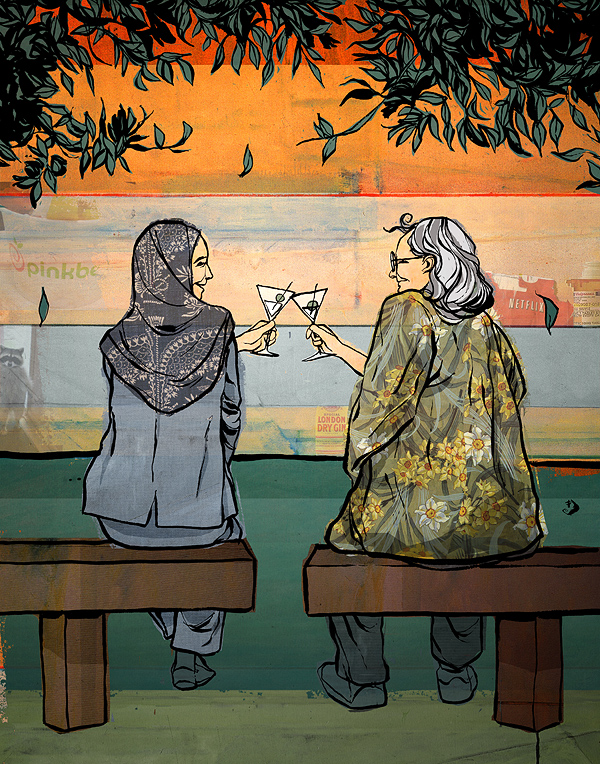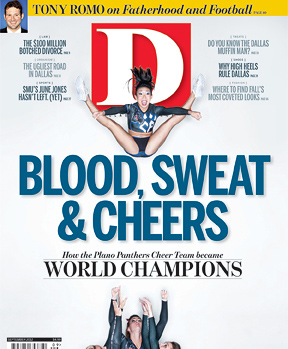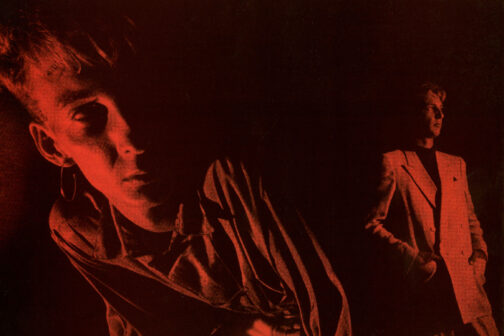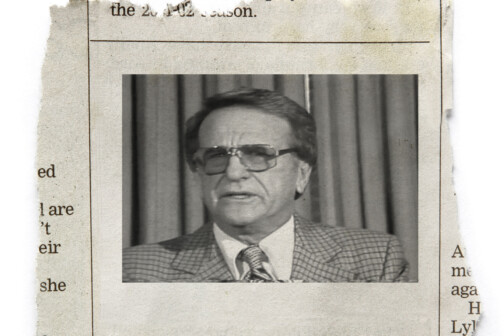On a warm, late afternoon in mid-December of 2009, my sorta-kinda boyfriend told me he wanted to date other women. We hadn’t been discussing our relationship, which was more of a friends-with-privileges-style affair than an I-love-you-forever commitment. We’d just completed one of our monthly runs to Costco. His Beemer was traveling south on the Tollway. As we crested the overpass at Lovers Lane, he pushed his sunglasses higher onto the bridge of his nose and, after outlining how we would split the 5-pound canister of Kirkland almonds, blurted out his desire to see other women as if he’d just read the sentiment on a billboard.
My first thought was “Damn, I’m going to have to spring for my own membership card at Costco.”

When he exited at Mockingbird Lane, my mouth opened, and I said the only thing you can say when your sorta-kinda boyfriend tells you he wants to date other women: “Okay.”
I’d played this game before and lost. I was married to a handsome man who told me he loved me every day. He sent me flowers for no reason. He once buried a 6-carat diamond tennis bracelet in my luggage so I would discover it when I unpacked in my lonely hotel room in Chicago. On a random Sunday morning, he strolled into the kitchen and said, “Honey, I want to date other women.” The mistake I made at that point was asking him why. His answer: “I already am.” This time I didn’t want any details, so I sat in the passenger seat in silence for the rest of the trip home, a single woman with 2.5 pounds of almonds.
Ten months later, the boyfriend, who for five years insisted he would never marry again, was married. I renewed my vow to watch more television. I treated myself to a brand-new 52-inch TV. I referred to “him” as my new boyfriend, Sam Sung. Sam and I passed the better part of the year catching up with real life. I watched all eight seasons of 24. Twice.
I also devised a clever plan to acquire my latest drug of choice, chocolate Pinkberry yogurt, without getting recognized by store employees. Several times a week, I would wear a hat or glasses and approach an employee with an excuse for why I needed a large order. “Hey, I’m having 20 people over tonight. How many take-home containers do I need?” I would ask as I slid a hundred dollar bill across the counter. I would take the five iced bags packed with my score and $3.29 in change, and I’d slink through the shadows in the Preston Royal Shopping Center parking lot, avoiding eye contact with passersby.
I convinced myself that being alone was healthy. My day job runs at a harried pace and having a boyfriend was like having a night job. I told myself that the bonus hours of free time were precious and essential to maintaining my mental health. Each night I comforted myself with a quart of chocolate Pinkberry topped with almonds. My biggest challenge was negotiating my high-tech remote control. Once I finally found “play,” my two dogs would each take a seat next to me, so close to one of my ever-expanding thighs that you couldn’t slide a piece of dental floss between us. As Jack Bauer saved the lives of presidents and paupers, mine came to a screeching halt. I had to make a change.
• • •
Meanwhile, a few miles north, my dear 82-year-old mother was living alone in her zero-lot-line home. My father passed away in 1986. Even though she was widowed, she led a full life. She had a large group of friends. They traveled, scoured museums, and threw outrageous Christmas and Super Bowl parties. She summered at her best friend’s house in Chautauqua. She cooked lobsters and read books at her close friend’s home in Maine each fall. Every spring, she headed to Santa Fe with her gal pals. Eventually she met a man she was content to spend time with. He wasn’t the great love of her life. I doubt he was a love at all. But she admitted it was nice to go to dinner and hang out with a member of the opposite sex.
Her dating life came to a halt a few years before mine. Her sorta-kinda boyfriend invited her to go on a weekend getaway. They had a lovely two days in Paris (as in Texas) and parted on a Sunday night. Monday morning, she received an email from the guy. He was getting married. To someone else. The following Sunday.
Unlike me, my mother did not just say, “Okay.” She hurled a string of spirited expletives like the sort she’d spent 50 years attempting to erase from my vocabulary. She told me she was “pissed.” I shuddered. I remembered when she grounded me for using that word.
By the time I got dumped, my mother was no longer pissed. She was happy and living the single life in her spotless Early American home in North Dallas. She spent her mornings conquering the New York Times crossword puzzle. Some days she lunched with friends or played with her (my) perfect grandson (nephew) in the backyard. Each night she nursed a glass of Merlot and watched reruns of House Hunters International. Except for Friday nights, when her weekly supper club, composed of old friends, met for drinks before they went out for dinner.
My mother, a voracious reader and strict grammarian, did not eat Pinkberry. She was addicted to Amazon.com and her monthly book club, The Old Hydes. They can spend hours discussing the writing style of Howard Norman or arguing the merits of Ian McEwan or Elizabeth Strout or Alice Munro. During the year I was immersed in my Jack Bauer coma, three of the five Old Hydes passed away, as did a few members of her Friday night supper club. Her social life was shrinking, and she, too, had to make a change.
• • •
We decided to merge our worlds and live together. I would vacate my peaceful little house on Shorecrest, across from the natural beauty of Bachman Creek, and move to her home near the heavily trafficked intersection of Preston Road and Spring Valley. It was a great plan. I would downsize, and we would both save money. I gave away hundreds of items I’d amassed during my years as a world traveler: wine glasses from Germany, fabrics from Africa, puppets from Uzbekistan. I crammed 58 years of living into one bedroom, one bathroom, and a walk-in closet.
The first night I spent in my mother’s house, I sweated through the sheets. I wasn’t anxious; I was hot. I was used to a steady nighttime room temperature of 60 degrees. My mother prefers 80. As I lay in a shallow pool of sweat, I thought back to the last time Mom and I had shared the same roof. It was 1970. I’d left home at 17 to attend college and never, like so many of my friends who dropped out, had to move back home.
It wasn’t like I wouldn’t have moved home. I’m grateful that I grew up in a stable household with two great parents and two younger siblings. There wasn’t much fighting or bickering. Unless you count the Joan Crawford moment that followed the discovery of two joints in my bedroom. Or the time my parents returned from a vacation in Japan to find a hole in the wall of the garage, which I’d made when I attempted to park my dad’s Olds 98. The damaged wall was only part of the problem. They’d noted the odometer before they left and discovered that I’d put 1,000 miles on the car. I was 13.
After I graduated from college, the “When are you going to get married?” questions started. As I romped through my 20s and early 30s, the guilt of not being married throbbed in the back of my head. I knew it was what my mother wanted for me, but I was too busy being a braless feminist with lots of boyfriends.
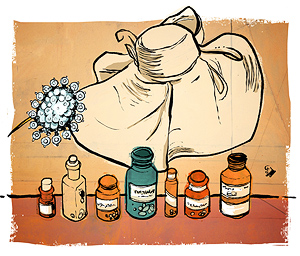
When I finally married at 34, my relationship with my mother changed. I was going to have babies, and she was going to be a young grandmother. My husband’s girlfriends squashed that storybook finish. And, for the first time in our lives, my mom and I were pissed at the same man at the same time. My divorce would end up being the best thing that ever happened to my mom and me. Our souls bonded.
Once word got out that we were living together, comments poured in from my stressed-out Baby Boomer friends. “It is so nice of you to move in with your mother before she really needs you,” said one who struggled with the guilt of not leaving Dallas to take care of her aging mother in California. Many of my friends were juggling 60-hour workweeks with the complexities of caring for aging parents. The long hours, concern for their own health, and the anxiety of shrinking 401(k) plans are not the life course many people my age had plotted. The Desoxyn we took to keep us up all night in college had been replaced by Cymbalta. My mother’s friends were equally approving. “You are so lucky to have your daughter with you before you actually need her to be there,” they said. What nobody understood was that I needed my mother more than she needed me.
• • •
It was early November 2010. I’d scheduled a fourth surgery on my arthritic hands. In the past, I’d downplayed the difficulties of having a carpal tunnel release or a thumb rebuilt. This time, I realized there wasn’t enough Pinkberry or hydrocodone in the world to get me through two months of taking care of myself.
After my surgery, Mom fed me soup and doled out my drugs every four hours. As I healed, we retreated into our own little world. Our domestic roles crystallized on a cold December night, when, as a fire blazed in the fireplace, we drank red wine and watched Grey Gardens. Not the Hollywood movie version. The 1975 documentary about two reclusive socialites, a mother and daughter, both named Edith Bouvier Beale, who lived in a decrepit mansion in East Hampton.
Nicknamed Big Edie and Little Edie, the two misfits lived in isolation for decades. (Big Edie’s husband divorced her by telegram, from Mexico, after he ran off with a younger woman.) As the two-story house that was perched against the gray sand dunes on the beach fell apart, Big and Little Edie rambled around in various stages of undress, sometimes staying inside for months at a time. Their story became quite scandalous in the early ’70s when the world learned that Big and Little Edie were the aunt and first cousin, respectively, of Jacqueline Kennedy Onassis. While Jackie was gallivanting around the Mediterranean with Aristotle, Big and Little Edie were eating cat food and playing tag with the raccoons and rats that roamed their house.
Mom and I couldn’t get enough of Big and Little Edie. We named our house Grey Gardens. I watched the video of Christine Ebersole’s portrayal of Little Edie in the Tony Award-winning Broadway show until I perfected her quirky, thick New England accent. “Oh, muthah dearah, could you mix my drink a littah stanguh,” I said as I sashayed into dinner, my head wrapped with a frayed pashmina held together with a gaudy brooch.
For her part, like Big Edie, my mother sang old show tunes in a high, screechy voice: “Picture you upon my knee / Just tea for two / And two for tea / Just me for you / And you for me — alone.”
When I finally returned to work, Big Edie ran errands and did the laundry. Now, when I walk in the door after a hard day at the office, Big Edie greets me with a gin and tonic. She has already walked the dogs, cooked dinner, and taken the Netflix discs out of the envelopes and lined them up by the TV.
Our relationship has not gone unnoticed. The rest of our family is concerned. Last Christmas I spotted my sister and brother shooting each other worried glances as Big Edie and I exchanged presents. I gave her some old pill bottles, a huge rhinestone pin, and a big floppy beach hat just like the one Big Edie wears in the documentary. She gave me new pantyhose to wear over my head.
Life at Grey Gardens isn’t perfect. We do have our differences. My mother is back on the “When are you going to get married?” bandwagon. She encourages me to get on Seniormatch.com and find a husband because I’m too young to be single. I insist she do the same. She has more time and energy than I do, and when we go out together, people think we are sisters.
Then there is the matter of television. Together we’ve spent the better part of this year watching British television shows such as Inspector George Gently, Downton Abbey, and The House of Eliott. On “slow” nights, when we peruse our DVR, she refuses to watch my recorded shows: Weeds (no small wonder), The Big C (“Oh, I hate that actress!”), and Dexter (“Disgusting!”).
When I first moved in, walking the dogs was a battle. We are both hardheaded and don’t want to burden the other person with chores. Our morning discussions ran like this: “I’ll take the dogs.” “No, I will. You did it yesterday.” “I have my shoes on. I’ll do it.” “No, it’s my turn. You stay.” And so on, until she leashed them up and walked out the door. I gave up. She is now chief dog walker.
I’ve joined The Old Hydes book club and added one of my friends to the group. Once again, the meetings are full of life and thoughtful discussion fueled by potent gin and tonics. The first time we went to book club, my mother pulled out the reading list she started in 1998. I was shocked to see more than 1,000 titles. I knew she read but had no idea she averages 72 books a year. Now when the TV watching gets tough, we hit the books and have our own private book discussions.
I’ve never had a better roommate. Yes, her natural motherly instincts are appreciated. Who doesn’t love to come home to a clean house and a good meal? But what I’ve learned from living with my mother is that I’ve had a best friend living right under my nose my whole life. My mom has filled a huge hole in my heart and my life. I now see her accomplishments clearly. She raised three happy children, married and nursed a wonderful man, built a life for herself by herself, and bought her own damn Costco membership.
Recently, she turned to me and said in her Big Edie voice, “You’ve got cha faathah’s body.”
I said, “You’re right, muthah dearah.” Then I broke into a mock show tune and sang, “And we’ve got a lot of living to do!”
• • •
EDITOR’S NOTE: Shortly after Nancy wrote this story, her mother fell ill. Complications developed in a preexisting lung condition called idiopathic pulmonary fibrosis. Jo Nichols died on July 28, 2012. Before she passed, she got to read this story. Donations can be made in her name to the Friends of the Dallas Public Library, 1515 Young St., Dallas, Texas, 75201. The money will provide memorial plates in the thousands of books she checked out of the library.
Get the AtHome Newsletter
Author



